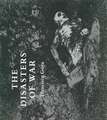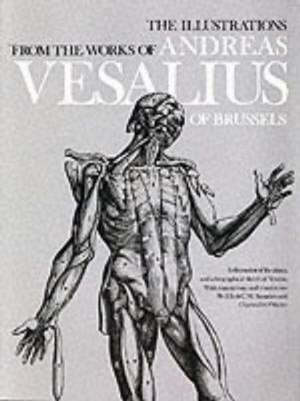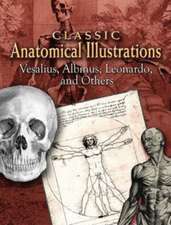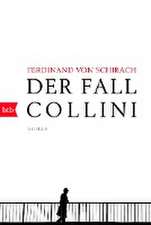The Illustrations from the Works of Andreas Vesalius of Brussels: A Study in Space Intuitions: Dover Fine Art, History of Art
Autor Andreas Vesaliusen Limba Engleză Paperback – 31 oct 1973
For this edition of the Vesalius illustrations, Dover has combined the best existing plates and text. The illustrations have been reproduced from the sumptuous (1934) Munich edition of Vesalius titled "Icones Anatomicae." The Munich plates were struck for the most part from the original wood blocks then in the collection of the Library of the University of Munich. These priceless art objects were destroyed in the bombing of Munich during World War II. Aside from the original copies of the woodcuts (of which only a few complete sets are known), the Munich restrikes are the best representations of the Vesalian anatomical drawings, for they preserve much of the freshness and richness of the 1543 edition.
The text of this Dover edition has been faithfully reproduced from an edition of Vesalius published by World Publishing Company in 1950. The editors, distinguished authorities on sixteenth-century medicine, have provided a very comprehensive history of Vesalius, his career, and excellent explanations of the legends surrounding the illustrators, artists, and publishers involved with the production of his books. No other source will provide the general reader, bibliophile, art historian, artist, or historian of science and medicine with such complete data on Vesalius and his fabulous anatomical illustrations.
Din seria Dover Fine Art, History of Art
-
 Preț: 155.24 lei
Preț: 155.24 lei -
 Preț: 92.99 lei
Preț: 92.99 lei - 16%
 Preț: 80.14 lei
Preț: 80.14 lei -
 Preț: 82.24 lei
Preț: 82.24 lei - 13%
 Preț: 118.99 lei
Preț: 118.99 lei - 25%
 Preț: 164.47 lei
Preț: 164.47 lei -
 Preț: 147.44 lei
Preț: 147.44 lei - 15%
 Preț: 122.23 lei
Preț: 122.23 lei - 14%
 Preț: 47.47 lei
Preț: 47.47 lei - 16%
 Preț: 112.04 lei
Preț: 112.04 lei -
 Preț: 83.91 lei
Preț: 83.91 lei - 16%
 Preț: 66.29 lei
Preț: 66.29 lei - 15%
 Preț: 79.75 lei
Preț: 79.75 lei -
 Preț: 104.31 lei
Preț: 104.31 lei -
 Preț: 78.75 lei
Preț: 78.75 lei - 17%
 Preț: 89.31 lei
Preț: 89.31 lei - 16%
 Preț: 66.02 lei
Preț: 66.02 lei -
 Preț: 64.30 lei
Preț: 64.30 lei - 17%
 Preț: 109.73 lei
Preț: 109.73 lei - 15%
 Preț: 62.73 lei
Preț: 62.73 lei - 19%
 Preț: 62.73 lei
Preț: 62.73 lei - 22%
 Preț: 132.45 lei
Preț: 132.45 lei - 16%
 Preț: 80.59 lei
Preț: 80.59 lei - 16%
 Preț: 111.96 lei
Preț: 111.96 lei -
 Preț: 89.28 lei
Preț: 89.28 lei - 16%
 Preț: 66.19 lei
Preț: 66.19 lei - 21%
 Preț: 135.84 lei
Preț: 135.84 lei - 16%
 Preț: 99.17 lei
Preț: 99.17 lei -
 Preț: 71.11 lei
Preț: 71.11 lei - 17%
 Preț: 75.90 lei
Preț: 75.90 lei -
 Preț: 68.44 lei
Preț: 68.44 lei -
 Preț: 66.76 lei
Preț: 66.76 lei -
 Preț: 119.79 lei
Preț: 119.79 lei - 16%
 Preț: 103.99 lei
Preț: 103.99 lei -
 Preț: 83.11 lei
Preț: 83.11 lei -
 Preț: 125.35 lei
Preț: 125.35 lei -
 Preț: 118.55 lei
Preț: 118.55 lei - 16%
 Preț: 77.97 lei
Preț: 77.97 lei - 17%
 Preț: 89.69 lei
Preț: 89.69 lei - 14%
 Preț: 56.08 lei
Preț: 56.08 lei -
 Preț: 95.85 lei
Preț: 95.85 lei -
 Preț: 53.62 lei
Preț: 53.62 lei - 16%
 Preț: 34.93 lei
Preț: 34.93 lei - 20%
 Preț: 161.35 lei
Preț: 161.35 lei - 14%
 Preț: 61.44 lei
Preț: 61.44 lei - 14%
 Preț: 63.61 lei
Preț: 63.61 lei -
 Preț: 113.60 lei
Preț: 113.60 lei -
 Preț: 96.93 lei
Preț: 96.93 lei - 20%
 Preț: 161.79 lei
Preț: 161.79 lei - 15%
 Preț: 107.53 lei
Preț: 107.53 lei
Preț: 106.04 lei
Preț vechi: 128.28 lei
-17% Nou
Puncte Express: 159
Preț estimativ în valută:
20.29€ • 22.04$ • 17.05£
20.29€ • 22.04$ • 17.05£
Carte disponibilă
Livrare economică 01-08 aprilie
Preluare comenzi: 021 569.72.76
Specificații
ISBN-13: 9780486209685
ISBN-10: 0486209687
Pagini: 255
Ilustrații: Ill.
Dimensiuni: 227 x 303 x 17 mm
Greutate: 0.82 kg
Ediția:Revised
Editura: Dover Publications
Seria Dover Fine Art, History of Art
Locul publicării:United States
ISBN-10: 0486209687
Pagini: 255
Ilustrații: Ill.
Dimensiuni: 227 x 303 x 17 mm
Greutate: 0.82 kg
Ediția:Revised
Editura: Dover Publications
Seria Dover Fine Art, History of Art
Locul publicării:United States
Textul de pe ultima copertă
The works of Andreas Vesalius (1514-1564) have long been regarded among the great treasures of the Renaissance. Published as medical books while he was teaching anatomy and dissection at the University of Padua, they include the "Tabulae Sex "(1538), intended as an aid to students; the magnificently illustrated "De Humani Corporis Fabrica" (1543), and the companion volume, the "Epitome "(1543). Individually, these books are milestones in the history of medicine. They also offer one of the most magnificent collections of anatomical drawings ever published. The plates were executed with such vitality and originality that they have been attributed to the most talented illustrators of the sixteenth century, not to mention Vesalius himself. Many of the drawings, in fact, were products of Titian's famous atelier.
For this edition of the Vesalius illustrations, Dover has combined the best existing plates and text. The illustrations have been reproduced from the sumptuous (1934) Munich edition of Vesalius titled "Icones Anatomicae." The Munich plates were struck for the most part from the original wood blocks then in the collection of the Library of the University of Munich. These priceless art objects were destroyed in the bombing of Munich during World War II. Aside from the original copies of the woodcuts (of which only a few complete sets are known), the Munich restrikes are the best representations of the Vesalian anatomical drawings, for they preserve much of the freshness and richness of the 1543 edition.
The text of this Dover edition has been faithfully reproduced from an edition of Vesalius published by World Publishing Company in 1950. The editors, distinguished authorities on sixteenth-century medicine, have provided a very comprehensive history of Vesalius, his career, and excellent explanations of the legends surrounding the illustrators, artists, and publishers involved with the production of his books. No other source will provide the general reader, bibliophile, art historian, artist, or historian of science and medicine with such complete data on Vesalius and his fabulous anatomical illustrations.
Unabridged republication of the (1950) English edition published by the World Publishing Company. 93 plates reproduced from the (1934) Munich edition titled "Icones Anatomicae, " published jointly by the New York Academy of Medicine and the Library of the University of Munich. 3 additional plates of preliminary sketches for the original title page of the "De Humani Corporis Fabrica." List of Plates.
For this edition of the Vesalius illustrations, Dover has combined the best existing plates and text. The illustrations have been reproduced from the sumptuous (1934) Munich edition of Vesalius titled "Icones Anatomicae." The Munich plates were struck for the most part from the original wood blocks then in the collection of the Library of the University of Munich. These priceless art objects were destroyed in the bombing of Munich during World War II. Aside from the original copies of the woodcuts (of which only a few complete sets are known), the Munich restrikes are the best representations of the Vesalian anatomical drawings, for they preserve much of the freshness and richness of the 1543 edition.
The text of this Dover edition has been faithfully reproduced from an edition of Vesalius published by World Publishing Company in 1950. The editors, distinguished authorities on sixteenth-century medicine, have provided a very comprehensive history of Vesalius, his career, and excellent explanations of the legends surrounding the illustrators, artists, and publishers involved with the production of his books. No other source will provide the general reader, bibliophile, art historian, artist, or historian of science and medicine with such complete data on Vesalius and his fabulous anatomical illustrations.
Unabridged republication of the (1950) English edition published by the World Publishing Company. 93 plates reproduced from the (1934) Munich edition titled "Icones Anatomicae, " published jointly by the New York Academy of Medicine and the Library of the University of Munich. 3 additional plates of preliminary sketches for the original title page of the "De Humani Corporis Fabrica." List of Plates.
Cuprins
List of Plates
Introduction
PLATES. The Title Pages of the Primary Editions of the De Humani Corporis Fabrica
Letter to Johannes Oporinus
THE PLATES from the De Humani Corporis Fabrica First Book Second Book Third Book Fourth Book Fifth Book Sixth Book Seventh Book
THE PLATES from the Epitome of th eDe Humani Corporis Fabrica
"The Venesection Letter of 1539, PLATE"
THE PLATES from the Tabulae Sex
PLATES showing evolution of the title page of the first edition of the De Humani Corporis Fabrica














